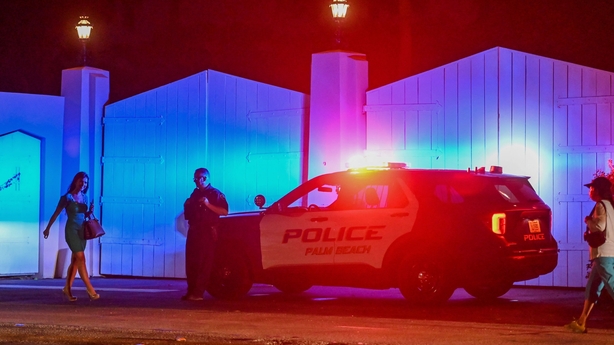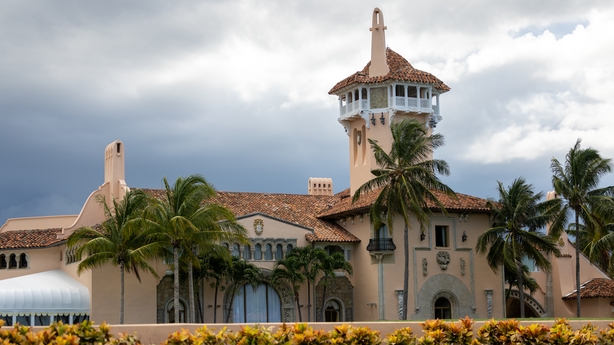The release of this heavily redacted FBI affidavit will not quiet down the controversy surrounding the "raid" on Donald Trump's Florida home. Far from it.
The media organisations who had sought the unsealing of the document had argued that it was in the public interest to disclose as much information as possible about the why - why the Department of Justice and its investigating arm had taken the unprecedented step of searching the home of a former president.
The FBI had argued the contrary, saying the affidavit’s publication would endanger an ongoing investigation, reveal witnesses, possibly reveal uncharged persons who might yet be brought into the investigations net, and would expose FBI agents to threat - something the FBI director had spoken out strongly against following a wave of death threats to FBI agents, an armed attack on an FBI field office in Cincinatti and the disclosure of the names of some of the agents involved in executing the search warrant at Mar-a-Lago.

In the end, the judge ordered the publication of the affidavit, subject to him agreeing to redactions and cuts to the test, which the FBI proposed to protect their information, sources and processes.
It seems the judge agreed with most of what the FBI proposed, for there is little new in what has been published, but lots and lots of thick black lines, suggesting lots and lots of stuff that would be interesting to see, but which we are not allowed to see while the investigation continues.
We get a few tantalising glimpses of what lies beneath those thick black lines.
The most interesting relates to a set of documents, known as the "fifteen boxes", which Mr Trump's aides sent to the National Archives in January of this year (after months of nagging from the Archives).
The FBI looked at documents from the fifteen boxes on 15-16 May, and found "184 unique documents bearing classification markings, including 67 documents marked as CONFIDENTIAL, 92 documents marked as SECRET, and 25 documents marked as TOP SECRET".

In terms of seriousness, the affidavit states the standard document security rating system is: "CONFIDENTIAL" – disclosure could result in damage to national security.
"SECRET" – disclosure could reasonably result in serious damage to national security.
"TOP SECRET" – disclosure results in "exceptionally grave damage to national security".
In the documents in the "fifteen Boxes", the FBI also "observed markings reflecting the following compartments/dissemination controls: HCS, FISA, ORCON, NOFORN, and SI".
The agent making the affidavit states "based on my training and knowledge", I know that documents classified at those levels typically contain National Defence Information (NDI).
Later the document helpfully breaks down what those acronyms mean:
HCS = Human Intelligence control system, designed to protect human intelligence sources – spies: people could be killed if their identities leak.
SI = Special Intelligence, typically intercepts of electronic communications.
ORCON = Originator Controlled: the person who wrote the document controls who is allowed to see it or pass it on.
NOFORN = No release to foreign governments, agencies or persons.
FISA = Foreign Intelligence Surveillance Act, law to protect intelligence gathered from foreign surveillance.
Based on that, and on foot of a complaint from the National Archives, the FBI believed there were likely to be more documents bearing these markings in Mar-a-Lago, and evidence of obstruction of previous requests to return them.
This was the "probable cause" test the affidavit had to meet to get the judge to sign a search warrant.
Elsewhere the document, in a footnote, states that one of the laws used to justify the search warrant (USC 18) does not use the term "classified information", but rather "criminalises the unlawful retention of information relating to the national defence", a term which courts have broadly defined.
Donald Trump, in a message sent out on his own social media platform "Truth Social" criticised the affidavit, saying it was "a total public relations subterfuge by the FBI and the DOJ". He also called it a "witch hunt".
Karl Rove, the former PR guru of the Bush-Cheney White House, urged the former president to go quiet, and deal with the issue through his lawyers.
He argued on Fox News that the Mar-a-Lago raid has dominated the news cycle for the past three weeks, giving the Democrats a chance to relaunch their autumn election strategy and allowing Joe Biden to wriggle out of scrutiny over inflation and his controversial student loan write-down.
Instead, the story is all about Donald Trump and controversy, which Mr Rove thinks isn’t helping the wider Republican party in November’s midterm elections.
But with most of the good stuff yet to come out from this affidavit, and the likelihood that more leaks will emerge in the coming weeks as the investigation continues, there is pretty much zero chance that the former president, his supporters and his detractors will keep quiet and let the FBI follow the process.






